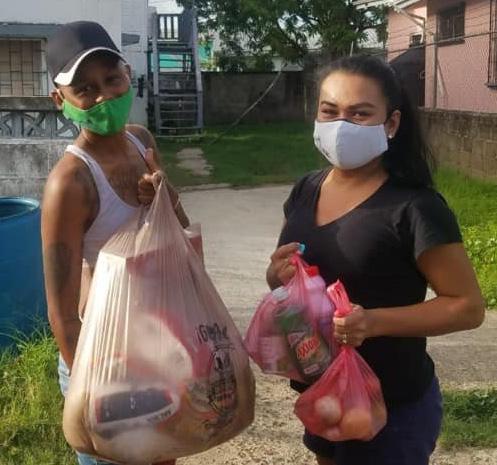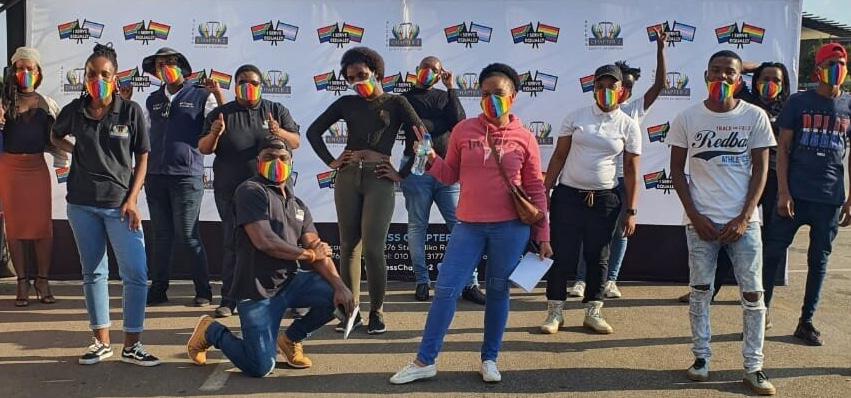
4 minute read
2. Under-resourced global movement for LGBTQI human rights
from Pride With Purpose: How Businesses Can Support the Global Movement for LGBT Human Rights
by GiveOut
Under-resourced global movement for LGBTQI human rights 2
United Caribbean Trans Network distribute emergency COVID-19 supplies, 2020.
Advertisement
The 2017–2018 Global Resources Report: Government and Philanthropic Support for Lesbian, Gay, Bisexual, Transgender, and Intersex Communities, 20207
Widespread human rights abuses
LGBTQI people around the world are subject to human rights abuses on a regular basis, including as a result of homophobic and transphobic attitudes and the lack of adequate legal protection. Discrimination can occur anywhere, including in offices, other places of business and public locations, such as schools and hospitals. Abuses include physical attacks, which often result in serious harm or death.
Consensual, private same-sex sexual activity remains illegal in 71 countries, while in 11 of those jurisdictions it is punishable by death.8 Additionally, at least 15 countries criminalise the gender identity or expression of trans people.9 LGBTQI people also often experience intersecting oppressions on the basis of other personal characteristics, including their nationality, race, religion or belief, and socio-economic status.
Underfunded LGBTQI movement
Across the world, LGBTQI activists and organisations are defending their communities against human rights abuses and campaigning courageously for equality. They are advocating with decision makers, conducting research to expose discrimination and violence, and providing vital services to their communities. Their efforts have brought about progress in law, policy and practice. Despite this momentum, the LGBTQI movement is critically underfunded worldwide. LGBTQI funding from donor governments makes up less than 4 cents out of every $100 of international development efforts and assistance, or just 0.04%.10 Those activists and organisations working in the Global South and East in particular face heightened challenges in accessing funds and resources, receiving less than one-third of all funding for LGBTQI issues globally.11 At the same time, donor governments and other funders often favour LGBTQI organisations with a more general focus, at the expense of those supporting specific and often more marginalised groups within the community. Funding for LGBTQI issues outside the United States specifically focused on transgender, genderqueer, and non-binary communities, for example, represents just 11% of all funding for LGBTQI issues, while for intersex communities it is just 2%.12 Where LGBTQI organisations can access funds and resources, the support given by donor governments and other funders is often tied to the delivery of specific projects or otherwise restricted. These restrictions

Lini Zurlia, Advocacy Officer, ASEAN SOGIE Caucus
ASEAN SOGIE Caucus, a network of LGBTQI organisations working across Southeast Asia, is making small “rainbow reachout” grants to grassroots LGBTQI groups as they adapt to the COVID-19 crisis and provide emergency support to their communities.
may, for example, prevent funds being used to cover essential costs like paying for office space, salaries and supporting staff well-being, or to provide emergency support. They also may restrict the use of funds by the organisation if it works on certain issues – for example, funds provided by a donor that forbids use of resources for pro-choice advocacy may indirectly exclude LGBTQI organisations that provide critical HIV/AIDS and other sexual and reproductive health services. Funding often also carries a large degree of bureaucracy and oversight for good reasons, including ensuring transparency and accountability, but which can impede the recipient organisation’s ability to act fast in emergency situations and divert time and capacity away from supporting LGBTQI communities. The risk of the process taking over from the impact is real. These challenges can be seen as opportunities for businesses and gaps for them to fill. Businesses are in a position to provide financial and in-kind resources to the movement with creativity and flexibility. LGBTQI organisations worldwide are looking to diversify their funding sources and build new alliances and constituencies. Seeking support from their communities locally and globally, they are calling on the private sector to support their work advancing LGBTQI human rights and equality.
COVID-19 exacerbating vulnerabilities
As noted above, while COVID-19 has had an unprecedented impact on all communities, LGBTQI people have been affected by the pandemic in intensified and unique ways. In its wake, it has exacerbated preexisting risks of domestic violence, homelessness, lack of healthcare and unemployment, while also giving way to anti-LGBTQI rhetoric across the globe. LGBTQI people have been blamed for the pandemic by politicians in countries such as the Cayman Islands and by religious figures in countries including Iraq, Israel, Liberia and the United States of America.13 In Uganda's capital Kampala, police used COVID-19 directives to arrest 23 people living at an LGBTQI shelter.14 In Hungary, the State of Emergency was used to propose a decree that would prevent transgender people from legally changing their gender in identity documents.15 Compounding the crisis, the economic fallout of the pandemic with understandably modified health priorities threatens the already limited funding that the international LGBTQI movement receives. Internationally, there is concern that development budgets might be further cut in the context of massive government debt and that initiatives supporting LGBTQI communities will suffer.








